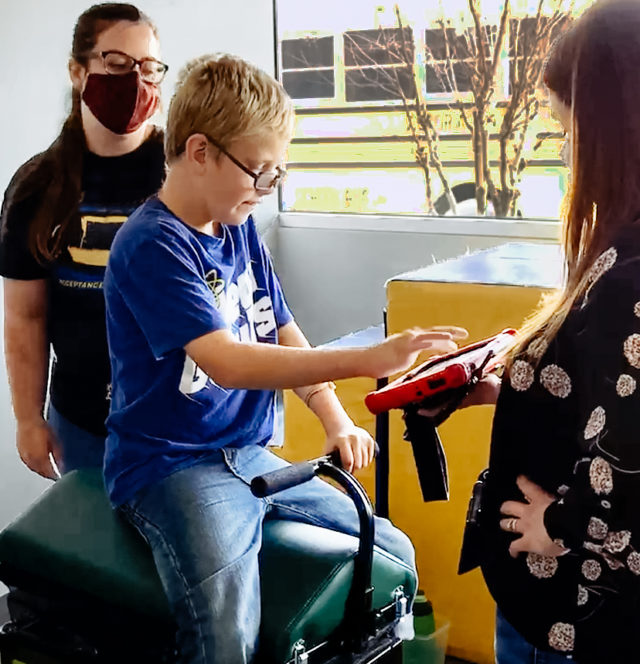By Audrey Patterson | Reporter
An interdisciplinary team of researchers and engineers received a $600,000 grant in 2020 from the Texas Higher Education Coordinating Board to study the effectiveness of a mechanical horse simulator as a treatment for children with autism.
This team included associate professor of mechanical engineering Dr. Brian Garner, clinical professor of educational psychology Dr. Julie Ivey, Jonathan Rylander, Paul Fillmore and Beth Lanning.
Equine therapy is a type of therapy that focuses on the improvement of motion by using the movement of the horse’s gait to improve hip stability. However, seasonal, physical and economic barriers can limit equine therapy for children; this influenced Garner to invent the MiraColt, a device that mimics the rhythm and motions of riding a horse.
“One of my prayers since I’ve been little is that the Lord would develop and cultivate the talents and abilities he’s given me to be a blessing to other people on to glorify Him,” Garner said. “I really see this mechanic horse as the fulfillment of that.”
Since receiving the grant, Ivey said the team has been putting the study in motion and is currently still accepting participants.
Participants are involved in a 12-week study and are required to be between the ages of 6 and 12, be diagnosed with autism spectrum disorder (ASD), have ASD-related motor deficiencies, follow verbal instructions and have an IQ of less than 80.
“If we got them in younger than that, they probably couldn’t do what we asked them to do; they may not sit still on horses,” Ivey said. “We have them do activities while they’re on the horse to help with their brain activity. We have puzzles and footballs in a basket. So they’re doing a lot of activities that include speech and motor while they’re riding. And if they’re too young, they wouldn’t be able to do some of those activities.”
Ivey said her role in the project, along with her graduate students, is recruitment, outreach and behavioral assessments.
“We are in charge of doing the behavioral assessment before, in the middle and at the end of the project to see if you can see if the treatment was effective,” Ivey said. “We’re looking for improvement in a lot of the behavioral things that are associated with autism.”
Ivey said in the study, they are hoping to see the children have improvements in language, balance, motor coordination, attention and social interactions that children with autism tend to have challenges with.
Garner said he hopes this can be life-transforming for many individuals. In one case, a family put a MiraColt in their home for a young man with cerebral palsy.
“I mean, a 26-year-old young man for the first time now is able to go to the bathroom on his own,” Garner said. “So, just simple things that we tend to take for granted are challenges for someone with a disability. If we are able to help folks like this overcome and improve in these areas, it has a substantial, positive impact on their quality of life.”
Ivey said the simulator mimics the motion of a horse, and for children with autism, this can be soothing.
“Kids with autism have sensory issues or have a hard time knowing where they are in space and being centered,” Ivey said. “And so, in riding that horse, they feel grounded. It’s calming, and it’s just something they like to do. If you think about it, when kids go to a carnival, they might go on a ride because it’s fun. It’s the same thing.”
Garner said he didn’t want the MiraColt to sit in the lab as just a fun project. Now, his dream is becoming a reality.
“We’ve had units sold as far as Australia and Qatar and a number of different places around the country,” Garner said. “We’re getting very interesting, exciting stories and testimonials about its benefit. And so that’s really thrilling. You know, you look back at all the years and the hard work in the lab. Many times, I wonder, ‘Why am I doing this? Why bother with this?’ And you know, that’s the reason, because now we’re being able to have an impact on people’s lives. That makes it worth it.”
As their study is not completed, there are no concrete results yet. Still, Ivey said, “some preliminary results or themes that we’re seeing have been a reduction in hyperactivity and anxiety, improvement in gross motor skills, improvement in expressive language and improvement in some emotional responses.”
“I’m very blessed to have a wonderful team,” Garner said. “I must also say that from the beginning, this whole project, I look back, and there’s no doubt in my mind that this whole effort was a gift from the Lord. And I don’t mean just the autism research. I mean the mechanical horse idea and all of its development and all the stages of that. Overall, I credit the Lord for gifting this technology to us, to Baylor and the exciting things that we’re seeing in this application.”
For more information or if interested in participating in the study, contact Ivey at julie_ivey@baylor.edu or 254-710-7564.


